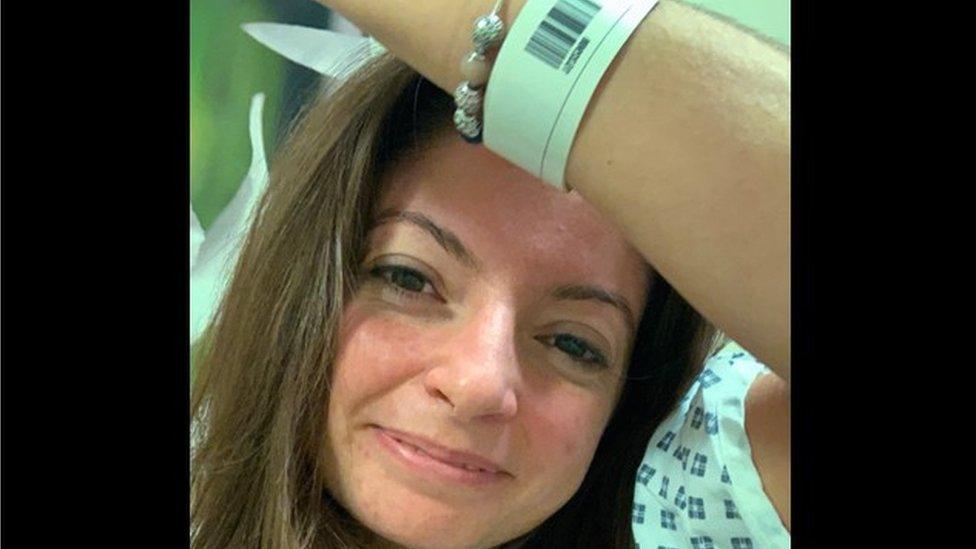Life with a stoma: Is there enough mental health support for those facing surgery?
- Published

Earlier this month, a man who did not want to live with a stoma died after a judge ruled life-support treatment could end. His story caused an outpouring of shock amongst the stoma community and prompted the question - is there enough mental health support for those facing surgery?
Having lived with a stoma for four years as a teenager, the complex emotions this patient must have felt weighed heavy on my heart.
The man, referred to as MSP, from South Yorkshire, was in his 30s and had given judge Mr Justice Hayden an "advanced decision" to indicate he did not want to live with a permanent stoma, after a decade of "painful and complex abdominal problems".
A stoma is an opening on the abdomen which connects to your digestive or urinary system and allows waste to be diverted out of your body and into an ostomy bag.
MSP had previously lived with a temporary stoma and had been advised it needed to be made permanent. The judge noted he had "utterly loathed life with a stoma."
He said: "His confidence and self-esteem has been adversely impacted. His capacity to forge and maintain interpersonal relationships has been significantly eroded."

I too experienced a decade of excruciating ill health at the hands of Crohn's Disease, a bowel disease which causes severe inflammation of the digestive system. Symptoms include pain, loss of blood, weight loss, diarrhoea and fatigue.
Aged 12 I was told I must have 90% of my large intestine removed and a temporary ileostomy formed.
I felt a crushing sense of anxiety but I also hoped that however hard it would be, it would give me my life back.
And it did. Once I had my ileostomy, I was able to go back to school, go on trips and see friends. These had been impossible whilst Crohn's obliterated my colon. My ileostomy made my life mine again.
Adjusting to it took time and extra support for my mental health was absolutely essential to my recovery.
MSP's decision has prompted many people to share their own ostomy stories and query whether there is enough support for people facing this life-changing procedure.
"Stomas save a lot of our lives"

Moeed Majeed, 29, from London, was diagnosed with Crohn's while at university and describes the period as a "really, really bad time".
But when the prospect of surgery arose he thought, "no way". He was given a year to decide.
He says at the time he wasn't enjoying life, felt terrible and didn't look the way he wanted so concluded: "I may as well try it and see what happens."
In some cases, stomas are formed on a temporary basis, to let the bowel heal or to help resolve an intestinal narrowing.
Some patients may have their stoma reversed, or it might have to be made permanent further down the line, like MSP's.
Moeed had his temporary stoma formed in 2015 and says adapting to it was challenging.
"It took me four to five months to get back on my feet and to a point where I felt confident and healthy enough to go back to work and go to the gym. Things I actually hadn't been able to do for a long, long time.
"I am really comfortable and happy with my stoma. I don't care what anyone thinks. Stomas save a lot of our lives."
Moeed says mental health support and talking to others throughout the procedure was crucial.
He was offered support, first through his university then later by his hospital, but acknowledges this is not always available.
"Having an outlet to talk about what's on your mind and what you're going through is beneficial.
"It empowers you," he says. "It's a bit upsetting it's difficult to get mental health support, because [I think] 65% of this whole thing is about your mental state."
"I wouldn't have been able to have children"
Mr Phil Tozer, a colorectal surgeon at St Mark's Hospital in London, performs stoma surgery for patients with inflammatory bowel disease and other conditions including bowel cancer.
He agrees mental health support for those facing stoma surgery is "relatively poorly dealt with, in the sense that there isn't enough resource for it".
He says: "Stomas are sometimes seen by patients as the price they pay to stay alive.
"For others, it isn't a price but a gift, which restores to them a quality of life which had been taken away from them by their disease".
Yvonne, 30, from Somerset was diagnosed with Crohn's aged 11. After years of battling a severe abscess she had stoma surgery aged 20.
"When I was told I needed a stoma I was very, very poorly and weighed about five stone. I had just had enough. I was just like 'please give me a stoma'."

A year after Yvonne had her stoma formed, she got married and says it was a "blessing" compared to the discomfort she faced before.
When she became pregnant, despite a few fears she says "as my belly grew, my stoma grew with it".
Her baby girl was born with no complications, and a couple of years later Yvonne had a second child.
"My stoma, my bowels and my body adapted to a new way of life," she says.
Yvonne's stoma was made permanent after her second child and says she's never encountered any issues with her mental health.
"If it wasn't for my bag, I wouldn't have been able to have children. If it wasn't for my bag, I never would have got married and had a family. If it wasn't for my bag, I would not be here today."

An NHS England spokesperson said funding was "growing" for mental health services "so more people than ever before are able to access high quality services whether that is following stoma surgery or in any other circumstance".
It said those "concerned" about their mental wellbeing should seek "early advice" from friends and family or self-help websites such as Every Mind Matters, external "and if your symptoms worsen then NHS is here for you".
Lisa Younge, the Crohn's and Colitis UK Nursing Programme Manager says more mental health support is needed.
She speaks to patients living with a stoma, or facing the decision about surgery, every day and says taboos around talking about bowels make people worry others won't accept their ostomy.
"So many people say to me at the beginning, 'there is no way I'm having that stoma' and I think allowing those feelings to come out and recognising why they feel like that is so important."
She says it's essential people gather as much information prior to surgery as possible and talk to others who have a stoma.
Often she speaks with these patients after surgery and finds the stoma has "changed their lives for the better".
You can follow Bryony, external on Twitter.For more Disability News, follow BBC Ouch on Twitter, external and Facebook, external, and subscribe to the podcast.

- Published10 June 2020

- Published4 June 2020

- Published2 June 2020

- Published20 June 2019
